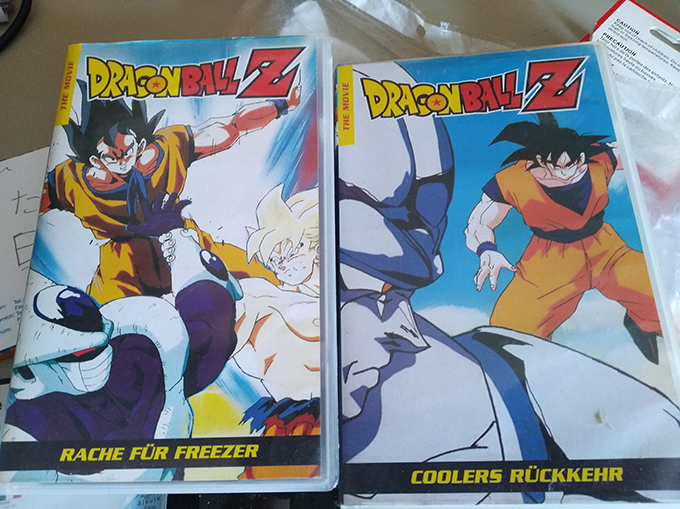Meet the German Dragon Ball Fan Who Moved to Japan

Do you love Dragon Ball enough to move to Japan and translate it for fans around the world? One fan named Andy did that, and we interviewed him to share his story.
For the Love of Dragon Ball
Andy, or @peraperayume on Twitter, became a Dragon Ball fan when he was a kid growing up in Germany.
Andy said, “One TV channel had an afternoon time slot with more and more anime coming in, and the first Dragon Ball series was there. It was on at 3pm so I didn’t always watch; just randomly.”
He was then introduced to DBZ. “August 2001, Dragon Ball Z was announced for an evening timeslot, so then I watched everything. I knew the first Dragon Ball series was quite good but it was on in the afternoon and sometimes as kids you’re busy playing outside so it doesn’t really work. Evening was more convenient, it was right after dinner so I could watch. That’s when it started becoming big in Germany as well. It became so successful that in the Namek Arc they were airing two episodes a day.”
Being in Germany, he grew up watching the German dub of the show.
http://youtu.be/f584bs6mbEQ
“Right now I’m more into the original but the German dub is still a nostalgic and legendary thing.”
He doesn’t have a favorite character, but highlighted Goku, Vegeta, and Frieza as being the canon characters he liked the most.
“The most interesting part of the series was the Saiyan to Frieza Arcs, which is more or less because it connects to the roots of everything. … For nostalgic reasons, the first VHS I bought was the two Cooler movies. So I’ll always have a soft spot for Cooler as a villain.”

Reigniting Interest
Andy didn’t pay as close attention to the Dragon Ball franchise in his early twenties after Dragon Ball GT finished up. His passion was reignited when Dragon Ball Z returned with Battle of Gods and Resurrection ‘F’.
“It became a trigger to get back into it. I got back into other anime, like One Piece and Detective Conan, where I was like 500 episodes behind. That was kind of the trigger point for learning Japanese. These anime I liked when I was young, I’m in my twenties and I still like them. So I thought it would be beneficial and convenient for me to learn Japanese.”
“From then on it started slowly. I had to learn the basic writing system so I could at least read a bit.” These are the 46 hiragana and 46 katakana characters that comprise Japan’s written language.
“What followed was my first trip to Japan, which was one week in Tokyo.”
Tokyo Travels and Translations
Andy’s greater gateway to Japan was through a Working Holiday Visa he had access to in Germany.
A working holiday Visa is a residence permit for young people which allows you to work in another country to help pay for your trip or studies.
“At first I was in Spain, then New Zealand, and after that Japan in 2018. I was lucky, I found a job in a gaming company my first week there and I’m still in Japan now.”
Learning the language and being in Japan opened up the doors for Andy to translate various forms of Dragon Ball content.
As I did English subs for the SDBH promo anime this time again, let me go through some things which I found interesting👀😃⬇️ https://t.co/Vwkmx7EbOR
— Andy 案太郎 🇩🇪 (@peraperayume) February 24, 2022
“Since I got here, my Japanese got progressively better, so I started tweeting translations of Dragon Ball. Sometimes random Japanese text appears and people are wondering what’s happening. Then I started and got people like @DBSHype and @DBSChronicles saying nice things about my content and that helped me to do a bit more.”
After this came the Coronavirus pandemic. “For my job I had fewer projects to work on, so I had a bit more time and I started working on other things involving Dragon Ball. I made fan subs for the Super Dragon Ball Heroes episodes. Some mini comics here and there. There’s always something.”
Still learning the language, there are unique obstacles and challenges that come with translating.
“If you translate an episode of Super Dragon Ball Heroes, the context is quite new. It’s a promotional anime for a game which is updated every two months. Before the update, the episode promoting it comes out. Sometimes you don’t know the exact context. It’s easier to translate text you can read, so you have to be confident in your listening skills. Japanese often has similar sounding words if you don’t know the context.”
“Incompetent God” by @hajime_tetsu
English Translation#DBZ #DBS #Kaioshin #frieza http://t.co/xO4je7ZBXe pic.twitter.com/mBUYZQRE5E— Andy 案太郎 🇩🇪 (@peraperayume) May 14, 2020
Dragon Ball Fan Culture
Besides the language and culture, there was a lot for Andy to adjust to in Japan compared to his time growing up in Germany.
“I’m from the German countryside, so I’m used to using a car for everything. Here in Tokyo I barely use it; mainly train all the time. Coming from a little village of less than a thousand people to a city of several million, that’s a big thing. … My wife is Japanese, so I’m getting used to the culture from that side too.”
You might presume he met his wife in Japan, but funny enough they met in New Zealand. He was already planning on moving to Japan, so it worked out perfectly.
Living in Japan has opened the door for plenty of opportunities and experiences beyond translating. Most recently, he was able to attend the Dragon Ball Super: Super Hero movie premiere.
35 minutes to go👀
World Premiere#DragonBallSuperSuperHero pic.twitter.com/XnI0D2Jlrq
— Andy 案太郎 🇩🇪 (@peraperayume) June 10, 2022
Andy has combined his love for Dragon Ball and the Japanese language in a way that helps bring more Dragon Ball content to international fans.
“As an anime fan, even though my Japanese is still growing, I’m at the level where I can translate and read the Dragon Ball manga. You have to be patient, but if anime is a part of your life, then you should consider learning Japanese. It opens doors, and you see more of the culture behind it.”
' . $comment->comment_content . '
'; } } else { echo 'No comments found.'; }